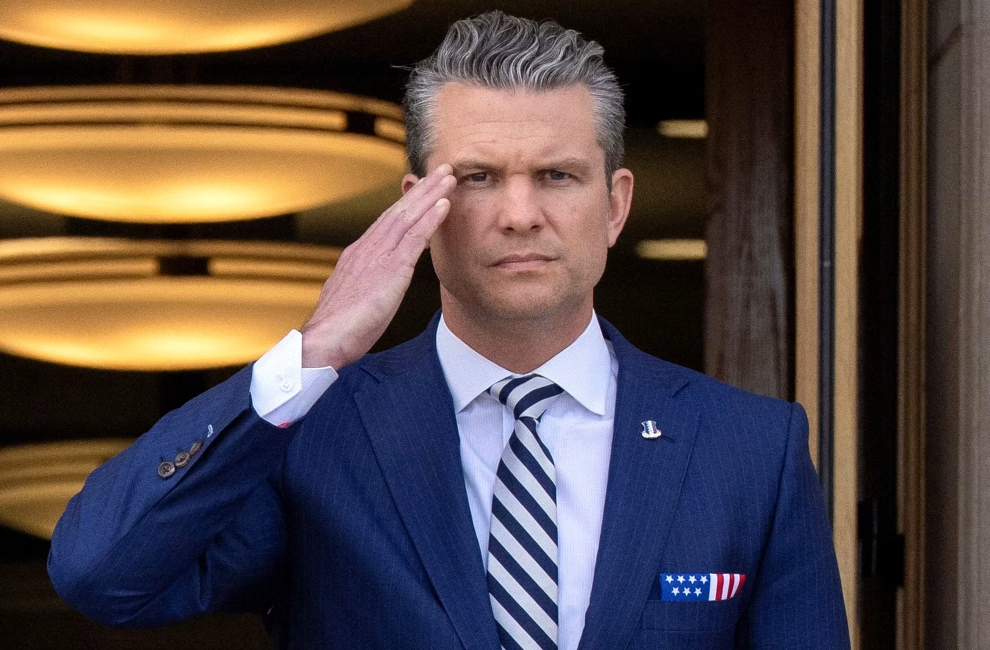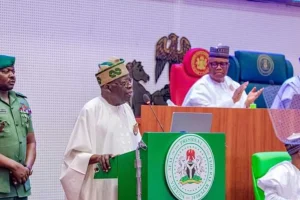The White House has said that President Donald Trump “stands strongly behind Pete Hegseth,” the US Defence Secretary, following reports that details of military attacks were shared in a private messaging group that included his wife, brother, and personal lawyer.
The controversy follows an earlier incident last month where a journalist was inadvertently added to a separate Signal group chat in which Mr. Hegseth and other US cabinet officials discussed plans for strikes against Houthi rebels in Yemen.
Now, the BBC’s US news partner CBS, citing sources familiar with the messages, has confirmed a report by the New York Times that Mr. Hegseth shared information about air strikes against Yemen in a second Signal chat.
While not directly denying the reports, White House Press Secretary Karoline Leavitt told Fox News on Monday that the president continued to support Mr. Hegseth, who she claimed was “doing phenomenal leading the Pentagon.” Ms. Leavitt suggested the reports were the result of internal opposition to Mr. Hegseth’s agenda. “This is what happens when the entire Pentagon is working against you and working against the monumental change you are trying to implement,” she said.
When questioned by reporters, Mr. Hegseth accused the media of being “full of hoaxsters” attempting to “slash and burn people,” but did not directly address the specific allegations about the second Signal chat.
In a statement to the New York Times, the White House maintained that no classified information was shared in the second group, which was reportedly created by Mr. Hegseth and titled “Defense | Team Huddle.”
The messages in this second chat, sent on March 15th, allegedly included flight schedules for American F/A-18 Hornet aircraft carrying out strikes on Houthi targets in Yemen.
Mr. Hegseth’s wife, Jennifer, a former Fox News producer, holds no official position within the Pentagon. He has previously faced criticism for reportedly including her in meetings with foreign leaders. His brother, Phil, and personal lawyer, Tim Parlatore, both hold positions at the Department of Defense, raising questions about why they would require advance notification of sensitive US military strike plans.
The existence of the first Signal group chat was revealed by Jeffrey Goldberg, editor of the Atlantic magazine, who was accidentally added to it by President Trump’s national security adviser, Mike Waltz. Officials reportedly used this group to discuss information related to upcoming strikes in Yemen. Mr. Goldberg left the chat after the initial attacks on March 14th.
While the White House has also denied that classified information was discussed in the first group, former US defence officials have expressed concerns, arguing that discussing such operational details on private messaging apps could jeopardise US personnel.
Signal employs end-to-end encryption, considered a high level of security for messaging apps. However, experts point out that this offers no protection if a device is compromised or if unauthorised individuals are added to group chats. Classified communications typically take place on secure, government-controlled systems.
The emergence of this second Signal group is the latest controversy surrounding Mr. Hegseth, who oversees a substantial Pentagon budget. Last week, he fired three top officials for what he claimed was an “unauthorised disclosure,” a charge the officials have denied as “baseless.”
Mr. Hegseth appeared to link the latest reports to these former officials, stating that it was “no big surprise that a few leakers get fired and suddenly a bunch of hit pieces come out.”
John Ullyot, a former top Pentagon spokesperson who resigned last week, wrote in an op-ed for Politico magazine that the department was in “total chaos” and that the “dysfunction is now a major distraction for the president.” He disputed the claim that the fired officials were leaking information.
However, Sean Parnell, the Pentagon’s current chief spokesman, accused the “Trump-hating media” of attempting to undermine anyone loyal to the president’s agenda, echoing the White House’s assertion that “there was no classified information in any Signal chat.”
The US maintains that its strikes in Yemen are in response to Houthi attacks on cargo vessels in the Red Sea, a critical international trade route. Since November 2023, the Houthis have targeted numerous ships, claiming their actions are in support of Palestinians in the conflict between Israel and Hamas in Gaza.





Add Comment